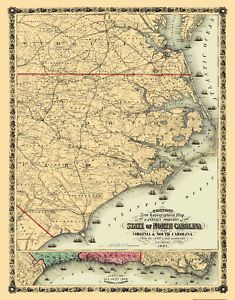 Meeting at the Liberty Grove Baptist Church in Alexander County, North Carolina, the United Baptist Association passes a resolution on army colportage and affirms unwavering support of the Southern Confederacy.
Meeting at the Liberty Grove Baptist Church in Alexander County, North Carolina, the United Baptist Association passes a resolution on army colportage and affirms unwavering support of the Southern Confederacy.
The Report on Colportage reads:
Your committee on Colportage submit the following :
“Whereas, our country is in a distracted condition, and so manv of our young men are in the field in its defence, and to a great extent destitute of the Gospel: Therefore we think the most efficient means to supply this deficiency is through the agency of our Colporters, and to expedite this good work, every church and every christian should become an agent in taking up collections, by which Testaments and religious tracts may be purchased to distribute among them, that they may have the word of life to console them in their troubles and thereby many may be brought to a saving knowledge of the truth as it is in Christ Jesus.
Respectfully submitted.
J. B. GREEN.
A resolution concerning the Confederacy voices Christian nationalism:
Resolved, That we as an Association fully endorse the cause of the Southern Confederacy ; and we advise all our brethren to discountenance desertion and to inculcate the principle that resistance to a tyrant is loyalty to God.
Alcohol in and of itself is also an issue, as is the case with a small but growing number of Baptist associations in the South. The United Baptist Association is on the cutting edge in staking out a blanket condemnation of alcohol. A member congregation is divided over the issue, and in response the association adopts the following:
We think it consistent with justice and our former practice to give Fishing Creek church clemency for one year to purge herself of Liquor Dealer’s Manufacturers, &c., and we advise Fishing Creek church to reconsider her act of Exclusion of those two brethren, and recommend the Association to send a committee to help settle their difficulties.
Delegates to the association also voice further disapproval of intoxicating beverages:
Resolved, That we recommend the churches to advise their members not to sell their fruit to distillers to make brandy, as it can be converted to much better use.
Staking out their positions on these various matters, the attendees — all white males — return to their home churches with a written stamp of approval for the Confederacy and against alcohol. Associational resolutions, however, have no actual authority over congregational decisions, for local Baptist churches are autonomous. Some Baptists will continue to partake of alcohol in various ways. Some may even quietly resist the Confederacy.
Source: “Minutes of the United Baptist Association, formerly called the Kehukee Association, October 15-17, 1863” (link)


